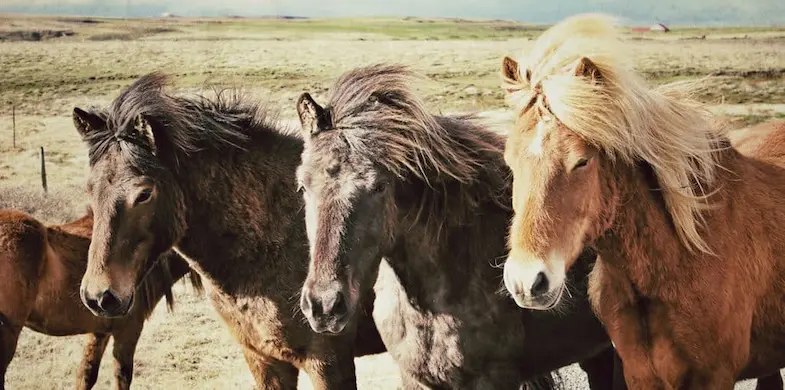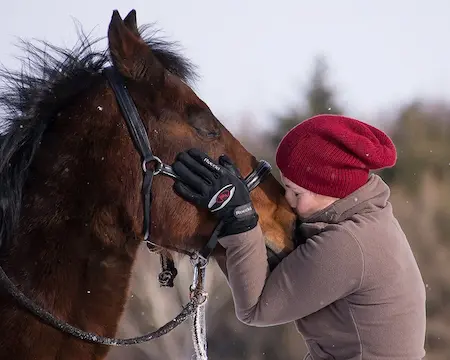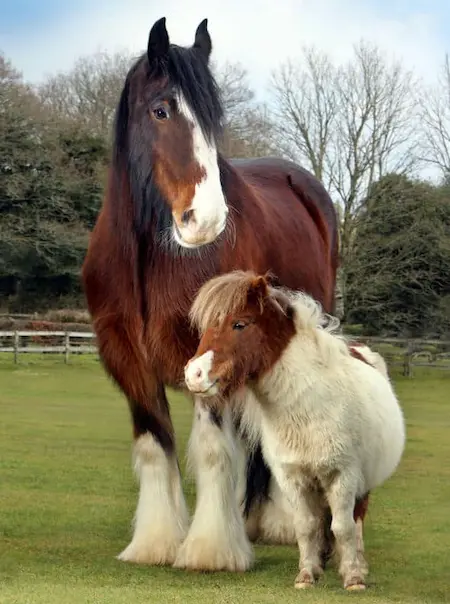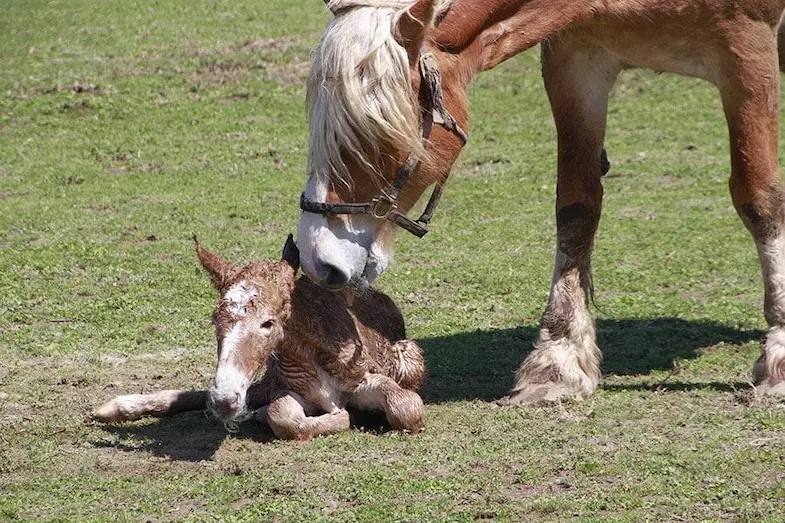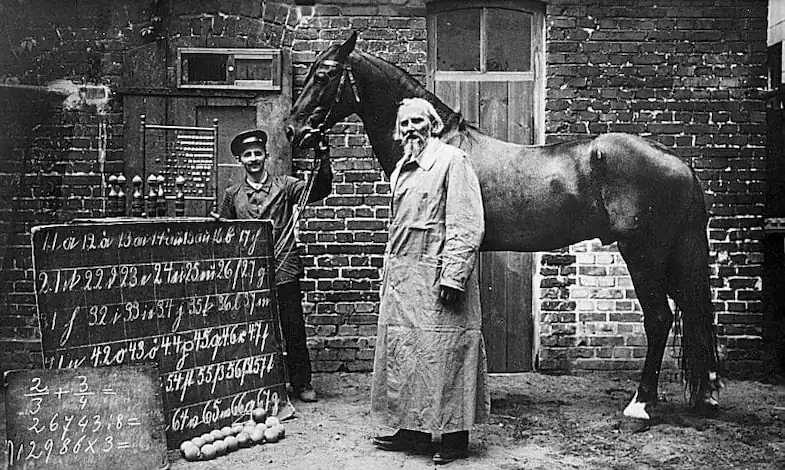We all know how smart dolphins are and that some dog breeds have the brain capacity of a 2 and half-year-old human but what about horses? Nobody ever says how smart they are or compares their intellect with humans so I thought it would be interesting to look into how a horse’s brain works and how smart they really are.
In order to understand how smart a horse is, or isn’t for that matter, it’s important to know how a horse’s brain works. After all, you wouldn’t compare the intelligence of a 30-year-old with that of a 5-year-old, so with this in mind, you shouldn’t compare a horse with a human, their brains are both wired very differently.
How do horses think?
We all know that horses are prey animals but unlike some predated animals, such as the rhino or a toxic amphibian that have a horn or poison to protect themselves, horses don’t have the luxury of such defenses so have to rely on their brain to help them survive. This gives us an idea about not only how their brains work but also how important it is to the horse’s survival.
Some people think that because a horse spooks at an open car door they must be stupid but in fact, this is actually the complete opposite, you and I know that it’s only a car door but to a horse, who doesn’t know what a car is, it could be a monster. And it’s that ‘could be’ that is crucial here, if the horse stays to find out what it is and it turns out it is a monster then they’re in big trouble so instead their instinct is to shy away from it, that way they survive. But the horse’s intelligence and ability to learn quickly is demonstrated by the fact that, although they may have shied away from it initially, after seeing the supposed monster just a couple of times they learn that it’s not a threat so very quickly ignore it. A horse’s survival is based 100% on how they react to possible threats so they need to be able to process that possible threat with lightning quick speed.
Being herd animals means that horses learn, not only from their mother, but also from the rest of the horses in the herd. This means that a young horse will not only learn the essentials but will also learn from the experience of the rest of the horses. While it was thought that the oldest mare in the herd was the matriarch recent studies have shown that it is actually the most experienced mare instead which is an indication of how important this is within the whole herd.
If you want to read more about what your horse is thinking then you might want to check this article out on understanding their body language.
Do horses recognize themselves?
Just because horses are smart it doesn’t mean that they are self-aware and while they do recognize other horses within their herd they don’t recognize a picture of themselves as just that, instead, they think of it as another horse.
When a mirror is placed near a horse they don’t realize that its a just reflection, instead they believe it to be another horse. In fact, they believe it to be another horse to such an extent that they will immediately feel relaxed and less stressed if they’re on their own and as such its often used as a boredom buster or de-stresser for horses. If your horse is particularly defensive over his food though and you place a mirror near his food he will think the ‘other’ horse is after it and try to defend himself from what he sees as a threat.
Do horses remember you?
If you visit your horse (or any horse) every day they will, of course, remember you, especially if you come bring treats but a horse’s memory goes much further than just remembering you from day to day. Horses have very close relationships with other members of their herd and to them, we’re just another part of that herd, albeit one that acts very differently.
If you’ve ever had to leave your horse for a prolonged period of time you’ll know how happy he is to see you again but what if you have to leave him for a few years? You might think that after a year or two he’d forget about you but you may be surprised. Around ten years ago now I bought a horse, the parents of his owner were moving abroad and because they weren’t able to take him with them he was being sold. The girl who owned the horse asked if she was ever back in the country could she come and see him, of course, I said yes but didn’t think she would. Anyway, around five years later she visited and this horse was so pleased to see her, he started neighing as soon as he saw her and it was like they’d never parted.
While this obviously may not be the case for every horse it’s certainly true that horses will remember you much more and for longer than you realize.
Are horses or ponies more intelligent?
Ponies are known for their stubbornness but in fact, it’s not so much that they are stubborn, more that they’re smart and know what they can and can’t (or more to the point will or won’t) do. For example, if your pony point blank refuses to ride through the water does it mean that he’s being stubborn because he won’t do what you ask nor does it mean that he knows if he goes through the water he’ll be cold and wet for the rest of the ride? Yes, I appreciate that to the rider it feels that he’s just being stubborn but in reality, he’s just using his brain and protecting himself.
Horses, on the other hand, aren’t as ’stubborn’ as ponies and are more willing to do what we ask but that doesn’t make them any less smart. Instead, you could argue that a horse knows that if it behaves and does what’s asked it’ll get rewarded with treats.
To a large extent they’re both as intelligent as each other but in different ways.
What’s the most intelligent breed?
While intelligence is more down to the individual horse than the whole breed there are plenty of breeds that, as is the case with dog breeds, have a tendency to be smarter than others. For example, hot-blooded breeds such as the Arabian and Akhal-Teké are widely thought to be the quickest learners while warmbloods are thought of as being the dumbest that said breeds such as the Quarter Horse can very easily disprove this theory. Gentle giants, such as the Shire horse or Percheron, are said to be the most laid back and willing to accept anything.
As a rule, the closer a breed is to its wild ancestors the smarter it is, this is because a horses intelligence and its ability to survive are closely intertwined and while there are plenty of smart breeds, the more removed from they are from wild horses the less their rely on the survival instincts.
There will always be an exception to every rule, for example, Thoroughbreds aren’t generally thought of as a smart breed yet speak to a handful of TB owners and guaranteed at least one or two of them will tell you stories about how their horse played lame to get out of having to do any work or how they worked out a way of unbolting their stable door so they could search for the feed room. And the same is true for Shetland Ponies, thought of as being very intelligent, I’ve known at least one or two who you certainly wouldn’t have thought of as being clever in any way at all. And there will of course, always be the horses that act dumb, not because they are but because they simply can’t be bothered to (or don’t want to) do what they’re asked to do.
There is a school of thought that says the smaller a horse or pony is the smarter they are, it’s believed that if they’re smaller then they can’t use their weight to their advantage so have to find another way. While there’s no evidence to back this up one way or another it’s certainly an interesting thought, and one that I’m sure plenty of owners will agree with (and disagree with to the same extent).
How do horses learn?
Right from the moment a horse is born they begin to learn, with their mother giving them gentle encouragement. The mother will use a kind of carrot and stick method to help her foal stand and begin to suckle, she’ll apply soft pressure to the foal to help him move in a way that is beneficial (and easier) for him, then when he moves the way she wants him to she’ll release the pressure. The carrot, or reward, part of this process comes in the form of milk which helps to reinforce what she’s teaching him.
As soon as the foal joins the rest of the herd he begins learning from the other horses too. He’ll play with them but will also watch what they do and start to instinctively mimic them. It’s this form of learning, known as social learning, that makes it possible for us to train them later in life.
As well as being quick learners horses tend to remember most of the things they’re taught (even if they do pretend not to remember) which is great for us, but it does also mean that negative habits that they’ve learned can be harder to stop. If a horse is predisposed to weaving, for example, then it might be better to keep him away from other horses that weave. You can read more about weaving here.
You can teach an old horse new tricks
We’re all aware of the old adage you can’t teach an old dog new tricks but this is absolutely not the case when it comes to horses. Yes, as a horse gets older he may not want to learn something new but providing he’s willing to learn no age is too old. Some people (including me) will, in fact, say that it’s actually a good thing to teach an old horse something new. It doesn’t have to be radically different like moving from a discipline such as cutting to dressage but could instead be as simple as teaching them to pick up something you’ve dropped.
Do horses act dumb?
Most horse owners will be able to tell you a story or two about how ‘dumb’ their horse is, even the owners of smart horses will have a story but are they really being dumb? There is a growing realization that our beloved horses are not at all dumb but are actually very good at acting like they are.
In the wild horses need to conserve their energy for when they really need it and, despite being very different from their wild ancestors, they still have the instinct (or desire) to not exert more effort than they really need to. At the same time, they’re very clever at knowing what they can get away with and who they can push their luck with. After all how many horses have suddenly gone lame just before being ridden, only to make a miraculous recovery when it’s feed time.
It’s not that horses are being lazy or dumb it’s the complete opposite, they’re happy to do something but won’t put more effort into it than they need to, which, if you ask me, makes them a lot smarter than we give them credit for.
The dumb things horses do that prove they’re actually smart
We’ve all heard stories of the funny things that horses have done but some of those things demonstrate how smart they really are.
- Breathing out – There’s a reason why we should walk our horses around after tacking up. Some horses will breathe out while you’re securing the saddle because they know that it then won’t be tight enough. Walking them around forces them to breathe naturally which then allows you to do it up properly.
- Feigning injury – When a horse doesn’t feel like doing any work he can’t just say to you that he doesn’t feel like it today so instead he has to find another way. Pretending to be lame is one of the most common ways a horse will try and get out of any work. That’s not to say that if a horse is lame he’s just pretending though.
- Being scared of shadows – As we talked about above, a horse being scared of something may seem daft to us but it’s an instinct that keeps them alive. While we may find this funny and laugh at how silly they are, in fact, a sign of, not just how smart they are, but also how important it is to their survival.
Interesting facts about horse intelligence
- Body language – This is so important to horses that not only can they read what each other is saying but that can also read and understand how we’re feeling and what we’re saying. The story of CleverHans (An Orlov Trotter owned by mathematics teacher, Wilhelm Von Osten, who was said to be able to count) proves just how much of our body language they understand. It was believed that he was able to answer mathematical sums correctly, but research found out that Clever Hans was actually reading his owner’s body language, looking for clues as to whether he was right or not.
- Fast learning – While a horse will shy away from a threat the first time they see they will quickly learn whether or not it really is a threat. If a horse thinks a barrow, for example, is a threat he’ll understandably shy away from it but if he doesn’t learn that it’s not danger then he’ll spend his life on edge which can adversely affect him. After all, he’ll spend so much time running from it that he won’t have time to eat, sleep or do anything else. It’s because of this that they learn so quickly, far quicker in fact than dogs and most other animals.
- Problem solving – Horses are natural problem solvers which is why we have to constantly find better ways of keeping them in their stall or pasture. Some horses will ‘fiddle’ with the bolts and learn that they can open the door while others will go out of their way to try and open the door, but once they’ve learned that they can do that it’s far harder to stop them trying again. After all, if they let themselves out then they can try to explore the feed room!
- Inquisitive nature – If you turn up to see your horse with a bag in your hand guaranteed he’s going to want to know what it is and what’s in it. Yes, you could say that it’s because he’s nosy and that he wants to know what’s in it but it’s actually because he’s curious, not for any other reason than he just wants to know.
Further reading
If you’re keen on finding out more about how a horse’s brain works and how they communicate then you might find these articles interesting:
- Are horses smart than dogs?
- Do horses know their own name?
- Do horses get depressed?
- Why does my horse eat mud?
- Why does my horse weave?
- What’s my horse really thinking?
- Successfully bonding with your horse
- Preventing boredom
I hope you found this article helpful. If you did I’d be grateful if you could share it please as it would really help me.
Recommended products
Over the years I have tried hundreds of different horsey products, from various blankets and halters to different treats. Some I’ve loved, others I’ve hated but I thought I’d share with you my top all-time favorite products, the ones I never leave the yard without. I’ve included links to the products (which are in no particular order) that I really think are great.
- Horse Knots by Reference Ready – If you’re like me and enjoy pocket reference guides then you’ll love this knot tying guide. These handy cards can easily fit in your pocket or attach to the saddle for quick reference. They’re waterproof, durable and are color coded to make them easy to follow.
- Mane ’n Tail Detangler – Even if you never show your horse you’ll need to detangle his tail from time to time (and possibly his mane too) which is always a challenging chore! I’ve found that if I run a little bit of detangler through my horse’s tails every few days it stops them from getting matted up and makes combing them easy, even if they’re coated in mud. I don’t know if I should admit to this or not but it also works wonders on my hair.
- TAKEKIT Pro clippers – Over the years I’ve tried a lot of different clippers and while some were obviously better than others I found these to be by far the best. They are heavier than a lot of other clippers but for me, that’s a good thing, it makes them feel more sturdy and hardwearing. On top of that they have a range of speeds so are just as good for clipping your horse’s back as they are his face. I also like the fact that they come in a handy carry case but that’s not for everybody. The company that makes them is super good and incredibly helpful too, a real bonus these days. The only thing I wasn’t keen on was the fact that it doesn’t come with any oil, but that’s not a major problem as it’s not difficult to buy lubricant.
- Shire’s ball feeder – There are so many boredom buster toys out there but I like to use these every day, regardless of whether or not my horses are bored. I find that it helps to encourage my horses to problem solve by rewarding them with treats (or pieces of fruit) but it also mimics their natural grazing behavior which helps to keep them calm and de-stressed.
- Horse safe mirror – This is a strange one that many people are surprised about but I like to put horse safe mirrors in the trailers as well as in the quarantine stalls. It helps to prevent the feeling of isolation by giving the impression of other horses being around. Being herd animals horses can get extremely stressed when they feel that they’re on their own but with these stick-on mirrors, they believe that at least one other horse is with them.
- Rectal thermometer – I know this isn’t glamourous at all but it’s vital for your horse’s well-being to be able to check their temperature and a rectal thermometer is the easiest way of doing this which is why I’ve added it to the list.
Shopping lists
I’ve also put together a few shopping lists of essential items that I’ve found helpful over the years. I’ve broken the lists down into different categories rather than put everything in one massive list 😉

